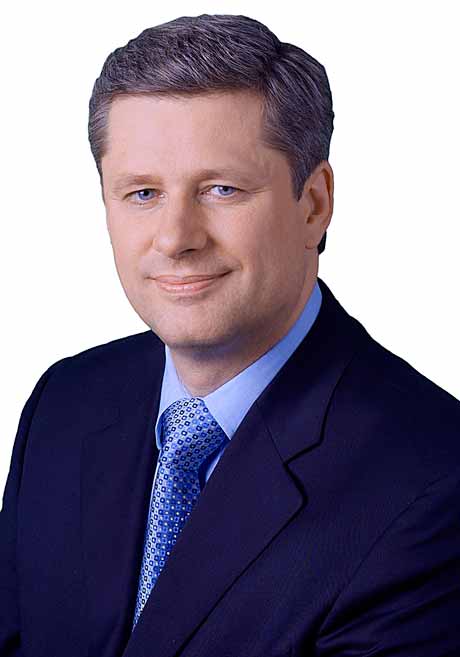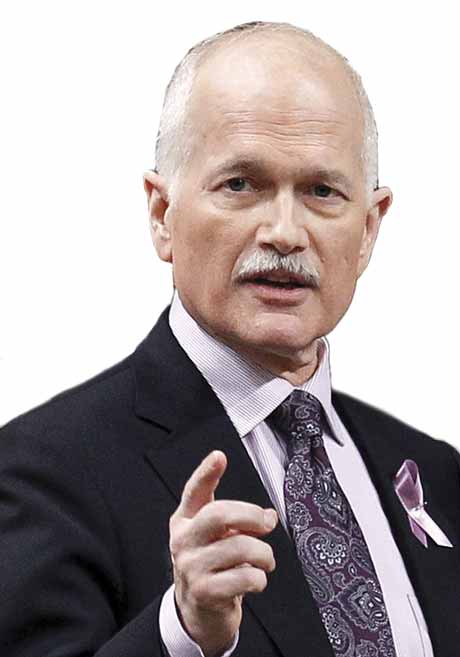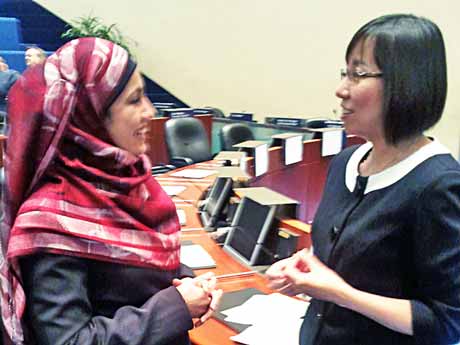
NDP unseats Liberals as Fed
official opposition

Conservative Party leader Stephen Harper went into this election - his fourth in seven years - seeking a majority and the Canadian electors rewarded him handsomely with 168 seats, enough for him to govern without relying on the support of any of the other parties as he had to do in the past.
The New Democratic Party was catapulted into second place with 103 seats, a historic win for them, leaving the Liberals in tatters with 33 seats and pulling the rug from under the feet of the Bloc Quebecois (3 seats). The Green Party has made it into the House for the first time with one seat.
The day after the elections Liberal Party leader Michael Ignatieff, who lost his own seat to Conservative candidate Bernard Trottier in Etobicoke-Lakeshore, has resigned from politics and announced he will go into private life.
Bloc Leader Gilles Duceppe also fell in the tidal wave that swept Quebec, courtesy of the post-debate momentum that
was created by NDP's Jack Layton in the final two weeks before the polls.
In Greater Toronto, long-held ridings by the Liberals fell to the Conservatives and NDP. Liberal veterans such as Alan Tonks, Mark Holland and hockey legend Ken Dryden were all struggling to keep their seats as the results rolled in.
The Conservative victory came with a price tag as several cabinet members suffered losses among them, Foreign Affairs Minister Lawrence Cannon and Veteran Affairs Minister Jean-Pierre Blackburn. But the Conservatives were able to add another nine traditional Liberal Ontario seats to their bag.
At the end of the day, real star of the election show was undoubtedly Jack Layton's NDP whose tally of seats moved from a fourth placed 36 in the last Parliament to a coveted 103 after the surge in Quebec. It's more than double the highest number of seats ever held by that party in the House of Commons.

By William Doyle-Marshall
Five days before eligible Canadians cast their votes to elect a new government a collection of aspiring Canadians assembled in Toronto City Hall's Council Chamber to launch an appeal for true respect for new Canadians.
Over the past three months they participated in The Newcomer Speakers' Bureau that is aspiring to change the way immigrants are treated when they arrive in the country. A group of sixteen new immigrants has been sharing their experiences, struggles and visions for change as part of a public speaking and leadership training series organized by the Mennonite New Life Centre and Voices from the Street.
It felt like a charge to the new government to do something exceedingly tangible for those individuals who come from various parts of the world to call Canada home. A chorus of 14 individuals who are graduates of the Newcomers Speakers' Bureau stood at a microphone and recited a litany of woes they have faced over the past five years in their respective bids to settle in Canada.
Lubna Igbal arrived in Canada from Pakistan with her Masters degree in physiology and like every immigrant, she had dreams of living here with her husband and have her family here, using her knowledge and skills to benefit everyone. During her job search, it became apparent that she had to study further to get a decent job. Determined to get ahead Igbal did a six-month diploma course as a laboratory assistant at a community college. That opened the doors a bit for her.
After her in-laws returned to Pakistan, Lubna quit her job to care for her children due to high daycare cost.
"Motherhood was too demanding and I thought that not working and taking care of my kids all day, I was not a useful person. I felt depressed and I had very low self-esteem. I did not think highly of myself. I would criticize myself on every little thing and I thought 'if I am not contributing to my family's needs, I am not a useful person. It was affecting me and my family in a way that I was afraid I am going to lose my sanity,'" she disclosed.
Anthony Albert left Sri Lanka as a very skilled university professor only to arrive in Canada as an unskilled individual. This forced him to wonder while living in Toronto – a world class city – what does it expect from immigrants.
"They want our skills or they want us to be low income families? So what does the Province of Ontario expect from immigrants? What does Canada expect from us? Why you need skilled people from all over the world? To cry, to suffer mentally? To depend on social assistance and RESP?" he wondered aloud.
Selucia George-Lodge came from St. Vincent with dreams like her peers. She encountered setbacks that resulted in her moving eight times in nine months, shifting between two shelters, being called names like minority or immigrant, ethnic. While trying to find a job, she was told by a human relations person there was no place for "her kind". "Up to this moment I am still trying to find out what is their kind. Certainly it's not an intelligent, passionate, spirited, young Black woman," she said.
While appealing for the authorities to deal with the immigrant situation, George-Lodge urged, "We must have equalization. In order to dispel the myth and misconception the other side of Canada has to be willing to understand us. Knowledge is universal. With the exception of a few, all of us were once occupied by the British. So I love life and I love people and I am now helping other people deal with some of the issues to fix some of the problems that they have."
"Canada still has serious issues with the treatment of immigrant for the immigrant population. How can we effect the change we want to see in the world? We must first begin with ourselves. From this evening remember: We choose Canada, Canada did not choose us," she concluded.
Cuban born Letitia Esquivel and her architect husband met the requirements of the Canadian Embassy for coming here, with more than 15 years experience in their respective fields. She worked in the field of mental health. "We had to struggle with some barriers such as the language, cultural isolation and lack of information. "It has been a hard journey full of different kinds of good and not so good experiences that have made us feel sometimes weak and vulnerable while others strong and powerful," Letitia told the Council gathering.
What matters most to these new Canadians, is having a real voice in the future of Canada. They are concerned that while politicians have been busy competing for the ethnic vote in their pre-election campaign, often they fall short on concrete proposals to address community concerns.